| Click above, for articles in
this issue.
The Bhopal Tragedy
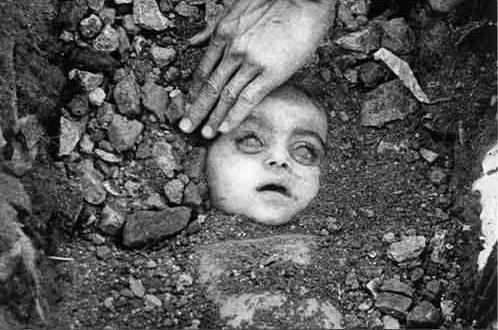
A child victim is buried.
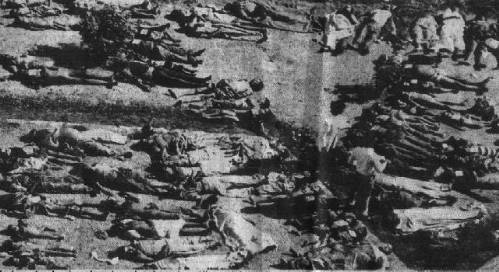
Some of the victims are prepared for burial.
The Tragedy
Late one evening, on December 2nd 1984, in Bhopal, India, a Union Carbide
plant that manufactured insecticides and pesticides had an accident.
During that night, 27 tons of methyl isocyanate vaporized into the air, becoming a deadly
gaseous cloud that would kill 20,000 people, expose half a million, and maime
120,000 victims. None of the plant's six safety systems were
successful in shutting off the gas, because none were operational.
One of the survivors, Aziza Sultan, described how she awoke at approximately 12:30 am
to the sound of her baby coughing badly. She then recounts how a white
cloud of gas which had entered her home, caused her eyes to tear, and cough
violently as a result of a burning sensation in her throat and lungs.
As she ran from her home she faced a cloud so thick that she found it difficult
to see. People fled dropping the scarves and shawls that covered their
faces. Soon many fell unconscious never to wake again. She herself,
who was two months pregnant, had a miscarriage as she was running, and also fell
unconscious. Many of the survivors found themselves blinded as a
result of being exposed to the gas.
After the accident no cleanup of the site was ever performed. In
December 1999, Greenpeace, an environmental activist group, found that the
soil and groundwater were still heavily contaminated with heavy metals and
organochlorides. A later study found mercury and lead in mothers' milk,
and many children of affected mothers, were suffering from gruesome
ailments and birth defects years after the accident.
Union Carbide and Dow Chemical
The company in 1989 arrived at a partial settlement with the Indian
government without any discussions with any of the victims. It paid $470
million as a compensation, roughly a payment of $400 to each victim.
Shortly after the accident, Union Carbide severed its operations in India. The
plant has never been cleaned up, much less the surrounding town of Bhopal.
As you read this, the contamination continues to spread.
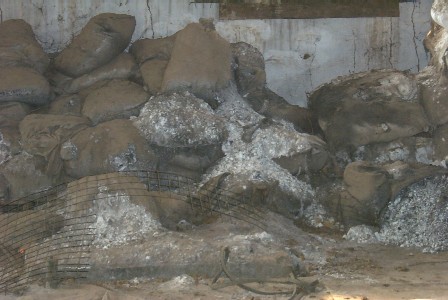
Sacks of pesticides still on site, gradually spread
poison in the wind and leech into the ground when it rains.
In 1991, Warren Anderson, Union Carbide's CEO was charged with manslaughter
by an Indian Court. Subsequently an international warrant for
his arrest was issued. Neither Anderson nor Union Carbide showed
any interest in entering a plea before the court. The U.S. Supreme Court
on October 4th, 1993 declined to review a U.S. Appeals Court decision that
reaffirmed that the victims of the Bhopal tragedy lacked legal standing to
seek damages in the United States court system. In 2001, Dow Chemical
acquires Union Carbide.
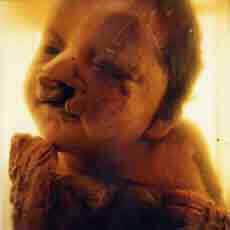
A deformed fetus, evidencing genetic damage.
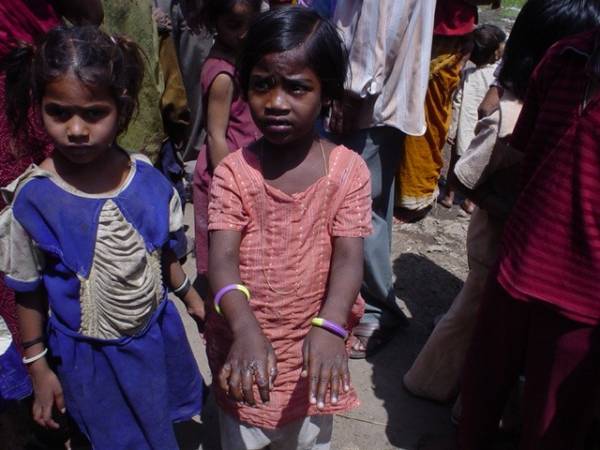
Children born after the accident bear the effects of genetic
damage.
The Campaign to Help the Victims
On September 27th, 2004, Congressman Frank Pallone (D-NJ), introduced
Congressional Resolution 503 which seeks to hold Dow Chemical responsible for
the Bhopal chemical disaster, on this the 20th anniversary of the
accident. The resolution asks that Dow Chemical and the Indian
government work together to ensure that Union Carbide clean up the site, provide
adequate water supply to the populace, and provide complete medical, social and
economic rehabilitation to the victims. An international network of activists who have dedicated their
time and energy to tell the world what happened in Bhopal are asking the
American people to support Frank Pallone's resolution, by contacting both Senators and Representatives in the
House.
The Bhopal accident has been the worst chemical disaster in history, it has
claimed thousands of victims, and continues to do so. To date neither
Union Carbide, nor Dow Chemical have attempted to clean up the factory
or the surrounding contamination. Twenty years later the silence of many
politicians, both Indian and American, has contributed to a tragedy that refuses
to go away.
L.M. / Contributing Correspondent
Posted October 10,
2004
URL:
www.thecitizenfsr.org
SM
2000-2011
You are here: HOME page-OLDER ISSUES-OCTOBER 2004 -Eye on Human Rights
Previous : Environment Next : Looking Back
|